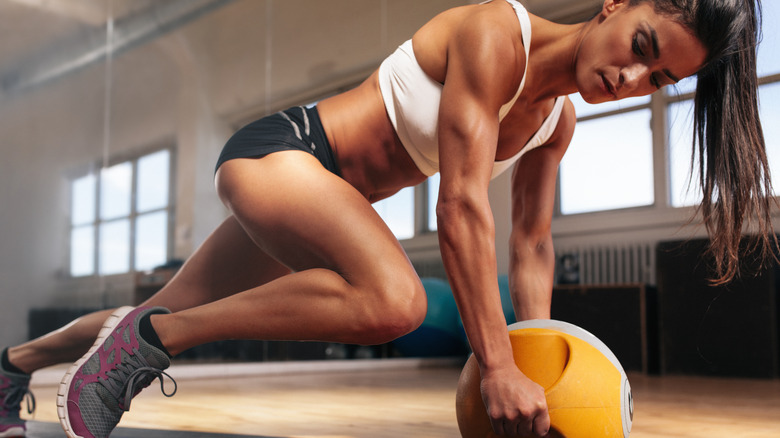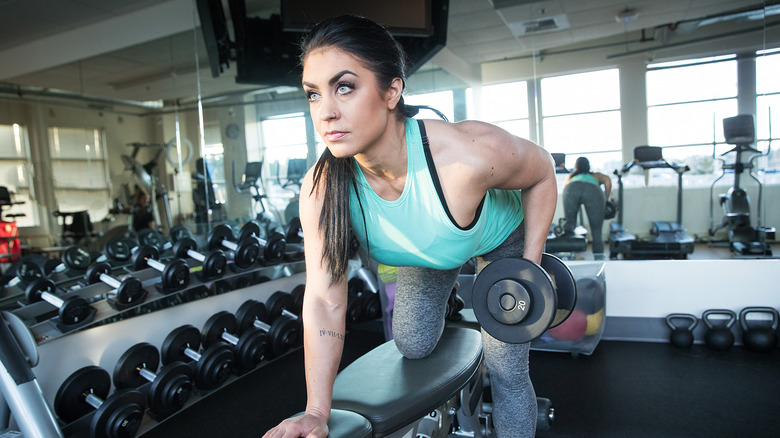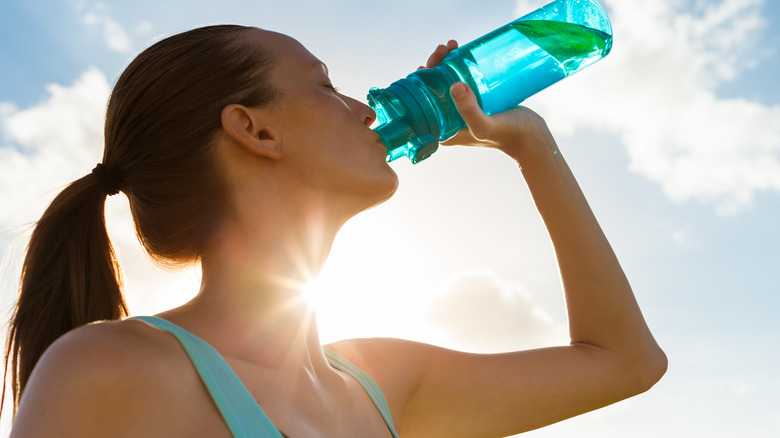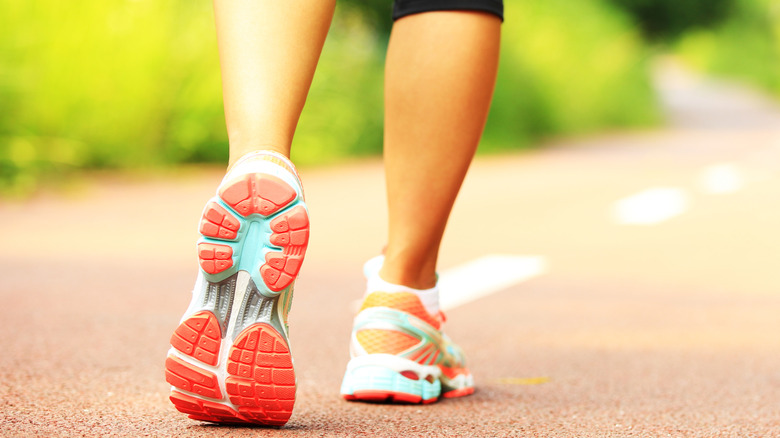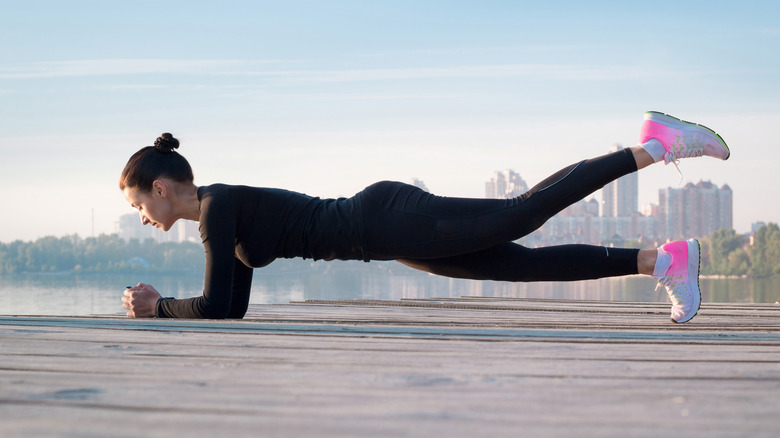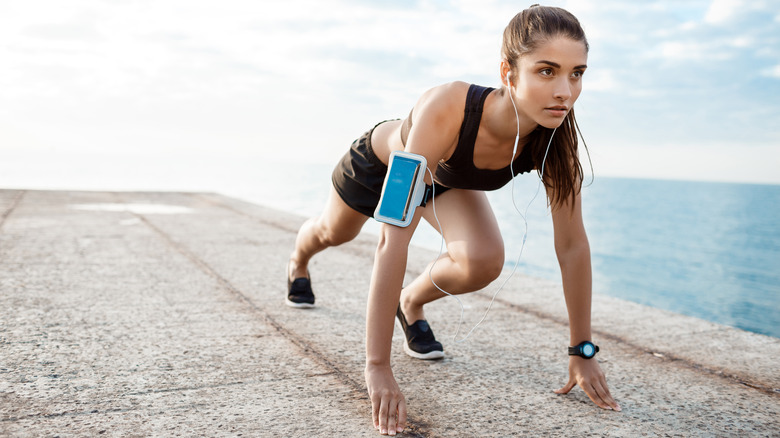How To Make Your Workout Benefits Last Longer
We're all trying to get the most out of our workouts, embarking on adventurous new exercises, and spending hours and hours sweating it out in the gym — even when we'd much rather be doing anything else. So, how do we go about prolonging the benefits we've worked so hard for? How do we stop ourselves from plateauing, and as a result, losing interest in our exercise regimen? And, most importantly, how do we tap into the "after-burn" effect, which might help us burn fat for up to three days after working out?
I asked a variety of notable fitness professionals for their top tips on how to make those workout benefits last even longer, keeping your healthy lifestyle on track and your mind — and body — fully engaged.
HIIT it hard
HIIT, or high intensity interval training, is the go-to workout of the moment, popularized by the likes of Kayla Itsines and her Bikini Body Guides. Personal trainer, and author of The Burn Revolution, Julia Buckley explains how it works, saying, "The short bursts of activity allow us to get right outside our normal comfort zones and exercise at a level of intensity we'd find impossible to maintain for a longer, steady session."
Fitness professional Diana Mitrea explained that HIIT boasts what's called excess post oxygen consumption (EPOC), which allows for an "after-burn" effect on your body post-workout. Essentially, this means you will continue to burn calories hours after training — even if you're just lazing around. But remember that the workout is called "high intensity" for a reason. Unless you push yourself to the limit (and beyond) throughout, you won't get those desired effects, later.
If in doubt, Malia Frey, the weight-loss expert at Verywell and founder of The Daily Diet Tip, suggests monitoring your heart rate throughout to make sure you're getting it high enough, and therefore, burning as many calories (both before and after) as possible.
Lift heavy
As women, we can sometimes be scared to lift big, heavy weights, for fear of getting bulky. However, it's worth remembering that weight training, like HIIT, is ideal for producing that elusive after-burn effect.
As Valerie Bisharat, wellness expert, certified personal trainer and women's fitness specialist through the National Academy of Sports Medicine, advises, "Weight training — using substantial weight — increases lean mass, which is absolutely critical in looking 'toned.'"
Buckley suggests mixing it up, so your body doesn't get bored. "Lifting heavy works even better if you do a workout featuring lots of different types of lifts, hitting muscles across the whole body," she says. If you work one muscle group and then move onto the next, "the body is going to work really hard — and take a longer time to recover, which lengthens the after-burn."
Eat right
What we do in the gym is, obviously, hugely important. But when it comes to food, the old adage applies: you simply cannot out-train a bad diet. If you're thinking you can eat terribly all day, every day, kill yourself in the gym and still see results, forget about it. Robert Herbst, personal trainer, coach, and power-lifter suggests we eat "a balanced diet with the proper macro and micro nutrients. Good proteins, fats, and carbs, with no junk."
As Ivana Chapman, personal trainer, nutrition coach, and founder of Lean365, explained, "Trying to fight the calories in/calories out equation can be a futile effort, if you're trying to keep your workout benefits." The more muscles you have, the "more metabolically active your body is." Also, if you've got a bit of a sweet tooth, keep in mind too that "Your insulin sensitivity will also be increased, which makes you more likely to use the carbs you're ingesting to build muscle rather than store fat."
Drink more water
Regardless of your fitness level or long-term health goals, what you should definitely be drinking more of is good ol' H2O. Make sure to get enough water throughout the day, too, not just during your workout. As Mitrea notes, "Just because the workout is over, it doesn't mean that your body is done needing water and electrolytes."
Water has a multitude of benefits, as Nina Niyri, trainer and co-owner of 4U Fitness, advises, "Drinking at least 64 ounces daily will assist your liver in doing its job: fat metabolism. It can also increase energy levels and assist in the recovery process." It may sound obvious, but drinking less alcohol will help prolong your fitness benefits, too. As Niyiri explains, "Alcohol calories take priority in your body over other fuel sources. When you drink, fat-burning stops until you burn off those calories."
Recover with food
Recovering from a workout is almost as important as doing the actual workout itself, and food is a huge part of that process. Although so-called high-protein smoothies are super popular right now, Mitrea advises staying away from them as the sugar contained therein "will be burned quickly and not give you energy for the rest of your day." If you want to maximize your recovery, Herbst advises "giving the body the proper nutrients within two hours afterwards: protein to aid muscle repair, and carbohydrates to restore muscle glycogen."
Ethan T. Schmidt, certified trainer and founder of GymBull, explains the science behind those elusive gains. "Your body doesn't just grow stronger on its own: it needs the fuel that you put into your body during [and] after a workout to do so." Tyler Spraul, certified strength and conditioning specialist, and head trainer at Exercise.com, says, "Even if you do nothing else, eating smart will be one of the best ways to hang onto your results the longest."
Recover with rest
Another major part of recovery, that many of us neglect, is rest. It's important not to work out every single day, as doing so risks long-term damage to our muscles, or even injury. (Even professional athletes take at least one rest day a week). Rest is imperative in the building of lean muscle, too. Franklin Antoian, founder of iBodyFit and one of SHAPE's Top 50 Trainers in America, says, "Your body recoups and your muscles grow when you're resting."
Schmidt is even more emphatic. "Your body doesn't benefit from working out," he says, "It grows stronger, the heart and every other muscle, by recovering from working out." While most people assume working out leads to more #gainz, this is not the case. Taking at least one rest day off each week "is the best way to make the gains that you earned in the gym last as long as possible." Buckley further confirms that "it takes a lot of energy to get your body from the rested state to exercising intensely. Allowing recovery leverages this."
Get plenty of sleep
In conjunction with taking rest days, it's equally important to ensure you're getting enough Zzz's each night, in order to prevent injury, and long-term joint and muscular pain. Herbst recommends, "At least seven and a half hours sleep so that the proper repair can take place."
If you're sleeping less so you can work out more, Spraul warns this could be detrimental to your long-term fitness goals. "If you are taking shortcuts in your recovery — especially sleep — you are cutting your results short of what they could be," he says. Niyri agrees, "Minimal sleep can lead to additional stress on the body and fat storage. Sufficient sleep will assist in muscular gains and is great for sustaining metabolic rate."
Keep it NEAT
As imperative as it is to work out and rest properly, it's equally important to stay active throughout your daily life in general, so that your fitness level can remain consistently high. Frey explains how to maintain your NEAT (non-exercise thermogenesis — all physical movement that is not actual exercise), saying, "You should stay active after exercise [to avoid slowing down your metabolism]. Boost your step count, and maintain light movement throughout the day."
Spraul breaks it down further, noting that your workout is only a small part of your week and that you should maximize your exercise time elsewhere. "Your activity outside of that time really counts towards keeping your results for the long haul," he says. "Some great options would be playing sports, walking the dog, swimming, yoga, hiking, etc. Mix things up and keep it exciting!"
Stretch, steam, shower
Stretching after a workout is hugely important, to prevent injury and minimize soreness. It will also, as Franklin notes, "Keep your muscles fresh for your next workout session." You're likely going to be sore after a long sweat sesh regardless, so a hot shower is the perfect antidote. If you're experiencing particularly painful joints, however, Herbst actually suggests the opposite — an ice bath — to reduce inflammation.
If you're not sure which is right for you, Tyson Brown, a Sydney-based personal trainer, advises going for a sauna as "getting hot after a workout helps with inflammation which means that more nutrients can go into your muscles." Or, you could try contrasting showers. "[Alternate] from a hot shower to a cold shower every 30 to 60 seconds" to ease muscle pain and further assist in your cool-down, he says.
Mix it up
Consistency is important. With HIIT, you need to keep your heart rate up. With weight training, Jamie Logie, certified personal trainer, nutritionist, and health coach, advises to "make sure you are using a sufficient weight that you can keep moving safely to give the muscles that time under tension they need, which should last at least 30 seconds."
However, if your fitness regimen is stagnating, try spreading your workouts out over the week. Chapman says, "Multiple, shorter workouts are more effective than one or two longer workouts each week. Shorter workouts allow you to work with more intensity, which means that you can lift heavier weights and build strength and muscle. The more muscle you have, the faster your metabolism." Brown even suggests breaking it up within the same day, doing 30 minutes in the morning and another 30 in the evening so "you're disrupting homoeostasis more than once during the day." Buckley doubles down on this idea, claiming that splitting your session into several short workouts could "drastically increase your fat burning and fitness gains."
Give it all you've got
As with anything fitness and healthy living-related, the best way to prolong your workout benefits is to ensure you're giving everything you've got, both inside and out of the gym. Take it seriously, treat your body with respect, listen to it, and make sure you're giving your burgeoning muscles time to recover, after you push them to their limits.
Remember that working out and staying fit involves more than just the time you put in on the treadmill, or in the weight room. It's everything else that happens around that time too, from what you eat and drink, to how much sleep you get, as well as how you choose to recover and rest. If we treat our bodies well, the results will speak for themselves.

